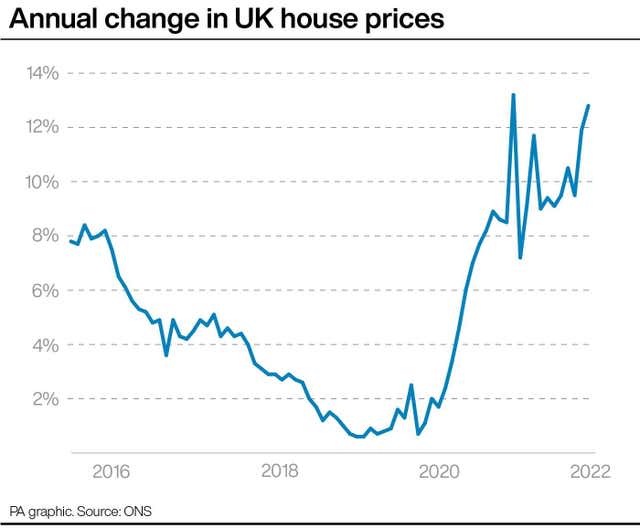Average UK house price is £32,000 higher than a year ago
The average UK house price has jumped by £32,000 in a year, adding to concerns about affordability as households grapple with the cost-of-living crisis.
Property values increased by 12.8% annually in May, accelerating from an 11.9% increase in April.
This pushed the typical house price to £283,000 in May, which was £32,000 higher than a year earlier, the Office for National Statistics (ONS) said.

Property values in England, Wales and Scotland all hit new record levels in May.
Average house prices increased over the year to £302,000 in England (up 13.1%), to £212,000 in Wales (14.4%), to £188,000 in Scotland (11.2%) and to £165,000 in Northern Ireland (10.4%).
Within England, the South West was the region with the highest annual house price growth, with average prices increasing by 16.9% in the year to May.
London had the lowest annual house price growth at 8.2%. The capital’s properties remain the most expensive of any region in the UK, at an average of £526,000 in May.
UK average house prices increased by 12.8% in the year to May 2022, up from 11.9% in April 2022 https://t.co/AUdw3VJrDV
— Office for National Statistics (ONS) (@ONS) July 20, 2022
The ONS also released rental figures, showing that private rents paid by tenants rose by 3.0% in the 12 months to June, up from 2.8% in the year to May.
Private rental prices grew by 2.9% in England, 1.9% in Wales and 3.5% in Scotland in the 12 months to June.
The East Midlands recorded the highest annual growth in private rental prices (4.3%), while London had the lowest (1.7%).
ONS house prices statistician Ceri Lewis said: “Annual house price inflation edged up again, with the strongest rises seen in Wales.
“London again saw the lowest increase, though prices there are continuing to accelerate.
“Rents continued to grow across the country, with the East Midlands seeing the biggest rises. London was again lowest, though its rate of increase continues to climb.”
Ceri Lewis continued (2/2) :⬇️ pic.twitter.com/uVwzq82zyL
— Office for National Statistics (ONS) (@ONS) July 20, 2022
The house and rental price figures were released as Britain’s rate of inflation surged to a fresh 40-year high, as rocketing fuel and food prices drove it closer towards double figures.
Consumer Prices Index (CPI) inflation rose to 9.4% in June, up from 9.1% in May and remaining at the highest level since February 1982.
Karen Noye, a mortgage expert at Quilter, said: “With the Bank of England expecting inflation to peak at around 11% later this year, a 50 basis points rate hike could well be on the cards at the (Bank of England’s) next monetary policy meeting.
“If this is the case, people’s spending power will be reduced and the already dwindling number of cheap mortgage rates will quickly disappear.
“With wages failing to keep up, the high costs of moving could put off prospective buyers and first-time buyers will see their hopes of getting a foot on the property ladder pushed further out of reach.
“A dip in demand could see a slowdown in the housing market over the coming months, and we could see a reversal of prices coming into the autumn when the true scale of the energy crisis unfolds.
“The UK continues to face a severe financial problem and the housing market will face its biggest challenge yet as the cost-of-living crisis takes hold.”
Mark Harris, chief executive of mortgage broker SPF Private Clients, said: “As house prices continue to rise, inflation soars to 9.4% and with more interest rate hikes on the way, there is growing concern around affordability and borrowing potential.
“Mortgage rates remain competitive, although they are on the rise. Borrowers need to move quickly to secure the best fixed rates as they are often pulled at short notice.
“With service levels varying considerably between lenders, it may take longer than borrowers anticipate, particularly if their case is complex, so advice is more important than ever.”
Richard Davies, managing director of estate agent Chestertons, said there is a “stronger sense of urgency to buy” among house-hunters, before further possible interest rate hikes.
He said: “We are seeing an uplift in the number of international students (and) international buyers, as well as office workers, who require a pied-a-terre closer to work.”
Nicky Stevenson, managing director of estate agent group Fine & Country, said: “The UK may be flirting with recession but you wouldn’t know it looking at annual house price growth.”
Jason Tebb, chief executive of property search website OnTheMarket.com, said: “Rising stock levels mean a subtle rebalancing of the market is inevitable, although this is likely to take several months.”
He added: “Despite sizeable headwinds, including soaring inflation and the prospect of further interest rate rises, those most serious about transacting are getting on with the business of moving.”

 Yahoo Finance
Yahoo Finance 